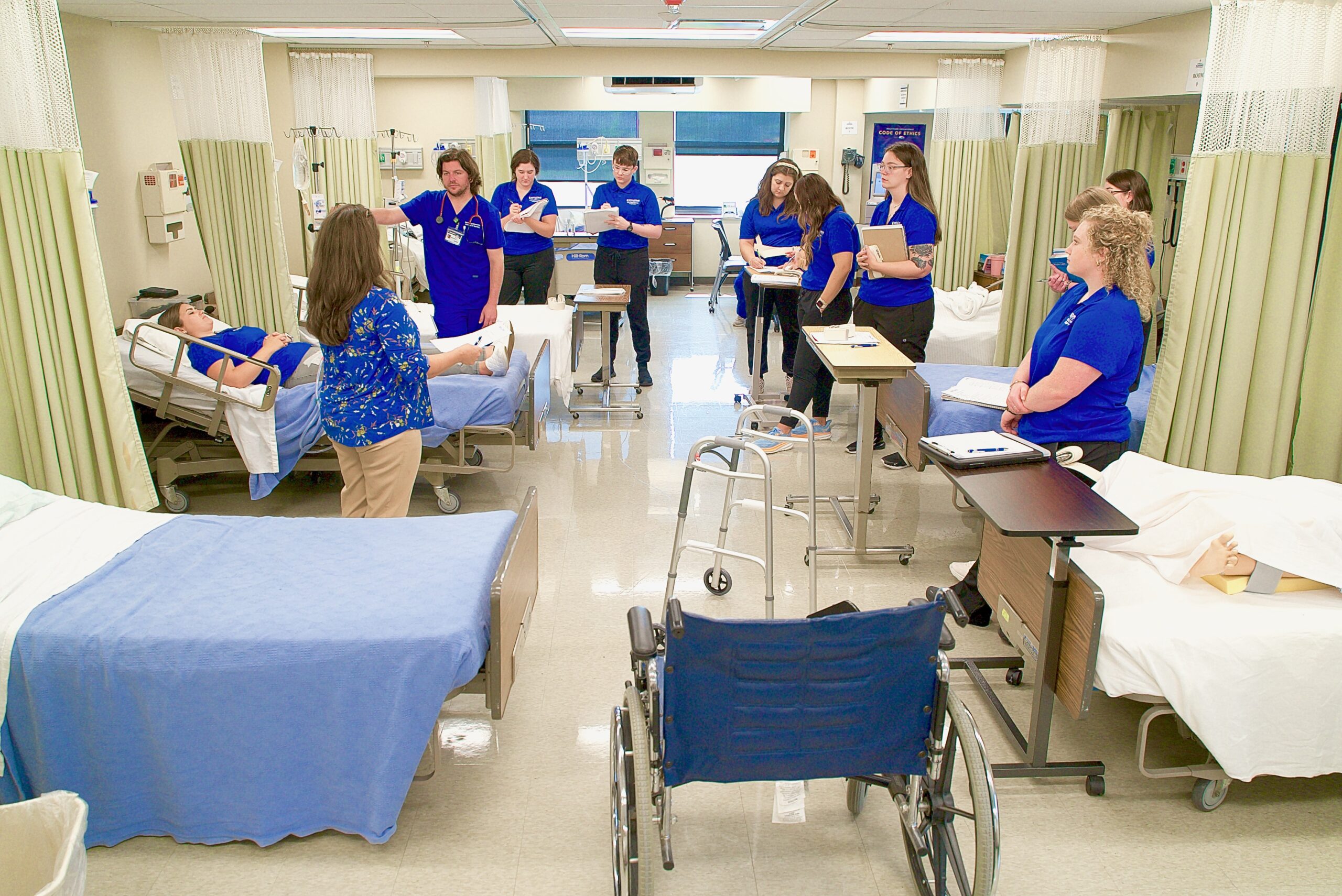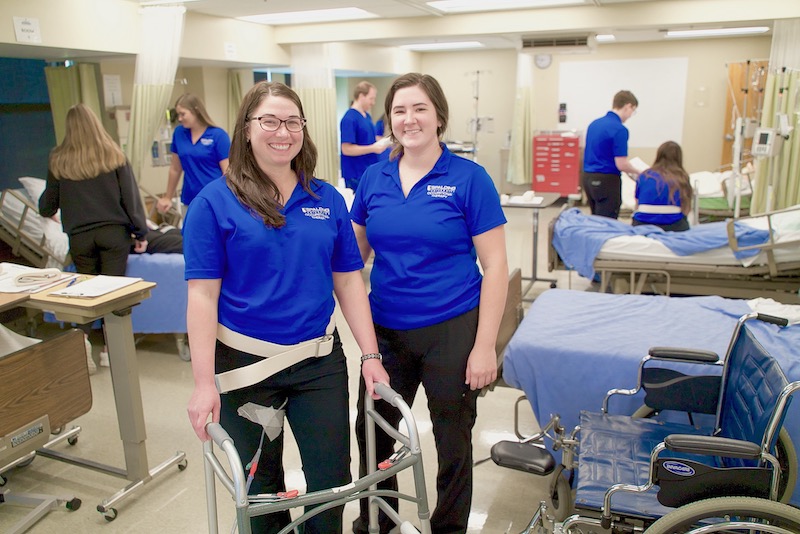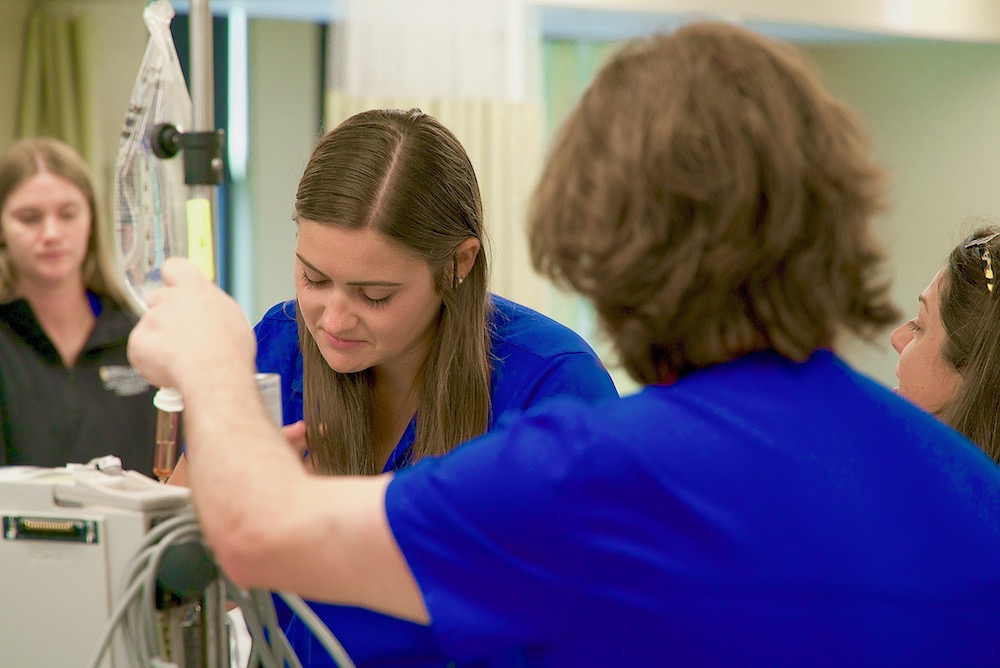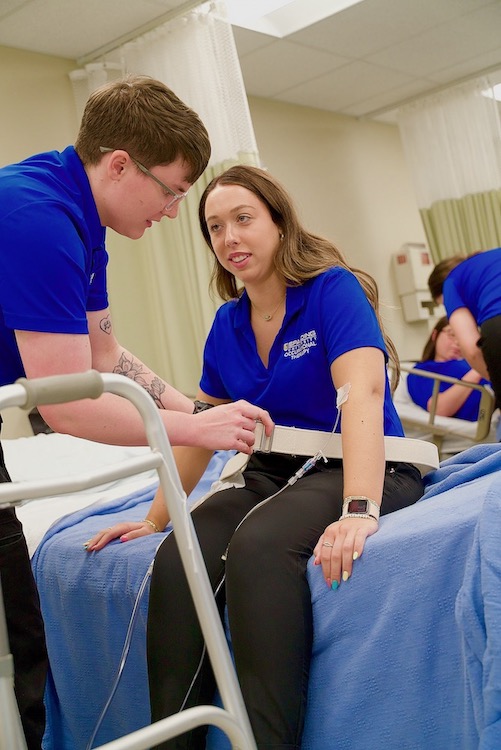Fieldwork & Capstone

About
Fieldwork experience is crucial to the preparation of an occupational therapist and is an integral part of the occupational therapy curriculum at Spalding. When students engage in fieldwork, they apply their classroom knowledge to real-life situations by serving clients at fieldwork agencies with whom the Auerbach School of Occupational Therapy (ASOT) strategically partners.
Fieldwork learning occurs under supervision by an on-site fieldwork educator, who will act as a professional mentor to each student. Fieldwork educators are identified by the agencies as qualified leaders and supervisors.
The Auerbach School of Occupational Therapy has a diverse network of clinicians who, in conjunction with our expert faculty, coach and mentor students through fieldwork across practice settings. Students can also gain valuable experience with the Kosair for Kids virtual immersive playground.
Level I Fieldwork
All occupational therapy students at Spalding University complete four traditional Level I fieldwork experiences and one specialty Level I fieldwork focusing on productive aging. These Level I fieldwork experiences take place one day a week for approximately 25 weeks during the second year of the program linked with academic learning experiences. The fieldwork experience is embedded within local pediatric settings, schools, hospitals, outpatient clinics, long-term skilled nursing facilities, community agencies, and with private practitioners. Weekly seminars occur on campus after the fieldwork visit has occurred for students to share and discuss learning experiences with each other as well as to begin learning how to document the occupational therapy process.
Level II Fieldwork
Upon successful completion of all Level I fieldwork experiences and preparatory coursework, occupational therapy students are required to complete 24 weeks of full-time Level II fieldwork to be eligible for taking the national certification examination in occupational therapy and to become licensed to practice in the United States. ASOT divides the 24 weeks into two 12 week Level II fieldwork experiences.
ASOT students at Spalding University complete Level II fieldwork experiences in numerous practice environments. ASOT has strategic fieldwork partnerships with practice settings in and around the Louisville-metro area, as well as out-of-state locations including Ohio, Tennessee, Indiana, Illinois, Maryland, Maine, North Carolina, New York, Georgia, California, Oregon, Colorado, Texas, Utah, and other states. International students may be able to set up one Level II experience in their country of origin in qualifying agencies to facilitate an experience that will support their return home, if desired. All partnering fieldwork agencies agreeing to work with ASOT have entered into contracts assuring that missions are aligned and educational standards for high-quality fieldwork and community-based learning experiences are achieved.
Placements
Each student is carefully matched with fieldwork agencies to provide well-rounded learning experiences. For Level I fieldwork, students may be expected to travel up to an hour and a half from Spalding University’s campus. For Level II fieldwork, students will be matched with settings inside and/or outside of the Louisville-Metropolitan area, to include out-of-state locations. Students are responsible for all fieldwork-related expenses, including but not limited to housing, transportation, meals, and additional fieldwork agency requirements.
Fieldwork Requirements
In order to ensure the safety of all stakeholders, to include clients, students, faculty, affiliating agencies, Spalding University, and the community at large, ASOT students must comply with the following requirements upon acceptance into this program and throughout their enrollment as ASOT students. Failure to comply with any of the following requirements may jeopardize a student’s enrollment status in the program. Students will:
- Complete criminal background checks upon admission into the program, at the beginning of Level I fieldwork, and per ASOT request and/or request of the fieldwork agency, as stated in the ASOT student handbook. Background check results must be clear of felonies.
- Maintain current immunizations, vaccinations, CPR certification, and proof of health insurance.
- Complete drug screens upon request of ASOT and/or the fieldwork agency.
- Complete education on infection control and prevention, HIPAA/HITECH, and corporate responsibility.
- Disclose to Spalding University’s Office of Student Accessibility if any health conditions, disabilities, and/or learning differences may affect the student’s performance, learning, and/or safety of self and others while completing any fieldwork experience. This step must occur prior to the beginning of any fieldwork experience. Students must provide a letter of accommodations from Spalding University’s Office of Student Accessibility to the Academic Fieldwork Director for these conditions to ensure student-to-fieldwork agency matches support student accommodations.
Fieldwork Educators
No occupational therapy educational program could be complete without support from and the assistance of the Level I and Level II fieldwork educators. Fieldwork educator is the title given by the American Occupational Therapy Association (AOTA) that identifies the individual(s) selected by the fieldwork agency as the lead person(s) who guides and supervises students of occupational therapy during on-site learning experiences.
Being a fieldwork educator is an exciting teaching and leadership opportunity, as well as skill builder. Upon meeting qualifications to be a Level I and/or Level II fieldwork educator, support, tutorials, and resources are provided to prepare fieldwork educators for hosting and supervising students from this program. Below are only a few of many benefits of being a fieldwork educator:
- Professional growth and enhanced competency as a practitioner
- Professional experience as a teacher, coach and supervisor
- Earning professional development/continuing competency units for certification and licensure renewal
- Direct relationship with academic institutions and faculty
- Access to university library resources
- Professional education opportunities

Capstone
The Occupational Therapy Doctorate Capstone provides you with the opportunity to advance your knowledge, skills and competence for creating, managing and leading an innovative occupational therapy program. You are able to demonstrate your abilities in a specialty area of occupational therapy practice. For example, your capstone experience in a community agency might focus on advanced concepts in hand rehabilitation, a sensory processing program for children with Autism Spectrum Disorder, or community mental health programming for individuals who are homeless. In the capstone experience you will create and lead a dynamic team that includes a faculty supervisor and agency mentor while enhancing health and human service programming for the selected population. At the conclusion of your capstone experience, you will develop a powerful piece of evidence-based scholarship that culminates with the presentation of your work.

